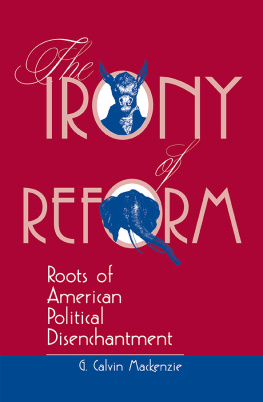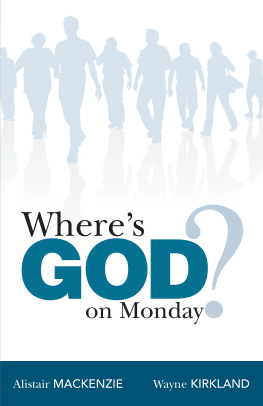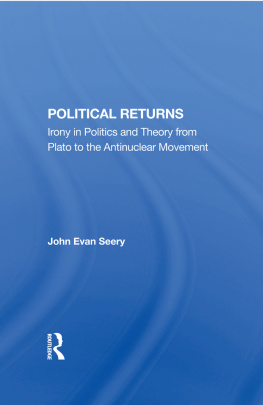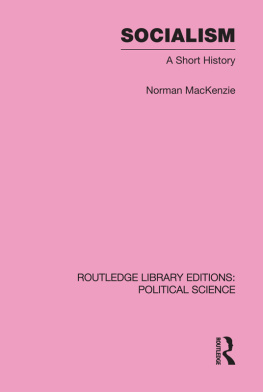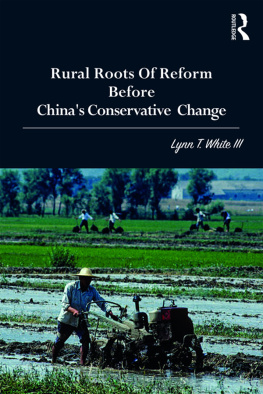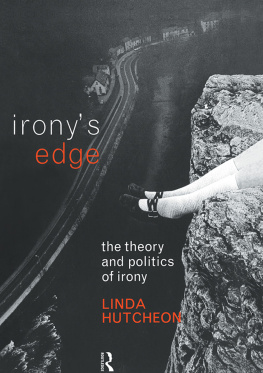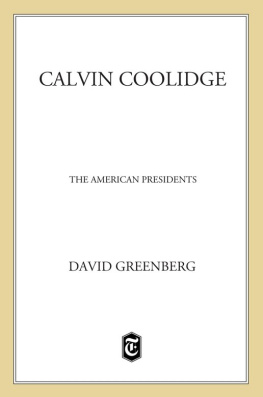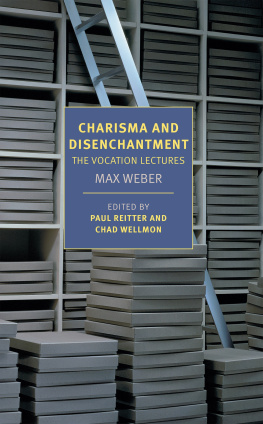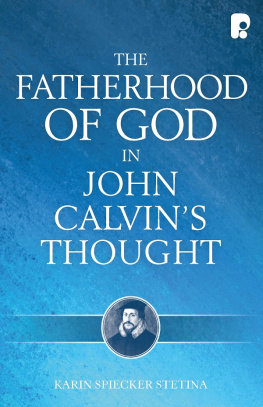THE IRONY OF REFORM
TRANSFORMING AMERICAN POLITICS
Lawrence C. Dodd, Series Editor
Dramatic changes in political institutions and behavior over the past three decades have underscored the dynamic nature of American politics, confronting political scientists with a new and pressing intellectual agenda. The pioneering work of early postwar scholars, while laying a firm empirical foundation for contemporary scholarship, failed to consider how American politics might change or recognize the forces that would make fundamental change inevitable. In reassessing the static interpretations fostered by these classic studies, political scientists are now examining the underlying dynamics that generate transformational change.
Transforming American Politics brings together texts and monographs that address four closely related aspects of change. A first concern is documenting and explaining recent changes in American politicsin institutions, processes, behavior, and policymaking. A second is reinterpreting classic studies and theories to provide a more accurate perspective on postwar politics. The series looks at historical change to identify recurring patterns of political transformation within and across the distinctive eras of American politics. Last and perhaps most important, the series presents new theories and interpretations that explain the dynamic processes at work and thus clarify the direction of contemporary politics. All of the books focus on the central theme of transformationtransformation in both the conduct of American politics and in the way we study and understand its many aspects.
FORTHCOMING TITLES
Extraordinary Politics: How Protest and Dissent Are Changing American Democracy,
Charles C. Euchner
The Divided Democrats: Ideological Unity, Party Reform, and Presidential Elections,
William G. Mayer
Revolving Gridlock,
David Brady and Craig Volden
New Media in American Politics,
Richard Davis and Diana Owen
Seeing Red: How the Cold War Shaped American Politics,
John Kenneth White
Governing Partners: State-Local Relations in the United States,
Russell L. Hanson
The Tragic Presidency,
Robert L. Lineberry
Congress and the Administrative State, Second Edition,
Lawrence C. Dodd and Richard L. Schott
THE IRONY OF REFORM
Roots of American Political Disenchantment
G. Calvin Mackenzie
Transforming American Politics
First published 1996 by Westview Press
Published 2018 by Routledge
711 Third Avenue, New York, NY 10017, USA
2 Park Square, Milton Park, Abingdon, Oxon OX14 4RN
Routledge is an imprint of the Taylor & Francis Group, an informa business
Copyright 1996 Taylor & Francis
One Million Lawyers, written by Tom Paxton, copyright 1984 by Pax Music (ASCAP). All rights reserved. Used by permission.
reprinted by permission of Congressional Quarterly Books.
copyright 1981 by Jethro K. Lieberman. Reprinted by permission of Georges Borchardt, Inc., for the author.
All rights reserved. No part of this book may be reprinted or reproduced or utilised in any form or by any electronic, mechanical, or other means, now known or hereafter invented, including photocopying and recording, or in any information storage or retrieval system, without permission in writing from the publishers.
Notice:
Product or corporate names may be trademarks or registered trademarks, and are used only for identification and explanation without intent to infringe.
A CIP catalog record for this book is available from the Library of Congress.
ISBN 13: 978-0-8133-2839-3 (pbk)
ISBN 13: 978-0-8133-2838-6 (hbk)
Publishers Note
The publisher has gone to great lengths to ensure the quality of this book but points out that some imperfections from the original may be apparent.
For Sally
Of course, there is no way in this cockeyed world of ruling out the extraordinary-cause-for-the-extraordinary-effect. You come by boat to Mann Gulch by way of the cliffs of the Missouri River where extraordinary ocean beds stood up and fought each other, but it seems as if the more that becomes known about big cockeyed things, including the actions of men and women as well as cliffs, the more they seem to reduce to one little cockeyed thing fitting closely to another of the same kind, and so on until it all adds up to one big cockeyed thing. Its never confusion, though, because ultimately it all fitsits just cockeyed and it fits and is fire. And of course that is extraordinary.
Norman Maclean
YOUNG MEN AND FIRE
CONTENTS
The unlikely beginning of this book occurred in a hot New England attic in 1988. There, while in the process of moving to a new home, I came across a box full of college notebooks I had not looked at for almost twenty-five years. I pulled one out and opened ita notebook from a course on Congress I had taken in the mid-1960s. As I turned the pages, I was reminded of a course vividly taught by a young professor who knew his stuff. The notes were well organized and richly detailed; they reminded me how much I had learned in that course and how it had helped inspire me to pursue a career as a teacher of government.
But in turning the pages, I noticed one other thing about those notes. They were all wrong. They were not wrong at the time, of course; but they were all wrong now. Virtually everything that we knew to be true about Congress in the 1960s no longer obtained. Everything was different. As an institution, Congress had been almost completely remade.
In the months that followed, I could not shake that experience, it made me wonder that if by focusing too narrowly on the subjects of my own research and teaching, I was missing something much more profound that was happening in American politics. If you stand too close to the front end of an elephant, it looks like a snake. I wondered if I was looking at elephants and seeing snakes.
I began to collect relevant books and articles, and during a sabbatical leave I burrowed into them. Every day I took a bag full of books to some comfortable placethe meadow behind my home, the ocean shore, a canoe on a Maine lakeand read about life and politics in America in the twentieth century. History, science, sociology, culture, technology: I read it all and struggled to see how it fit together. What emerged was a powerful picture of change, especially change in the way Americans govern themselves. The more I read and thought and talked to other people, the more astonished I was at the sweep of this change and at its impact on our politics and government.
Something powerful and complex and not a little mysterious had happened in America, and the pivot of the centuryand, in many ways, of all of American historical developmentappeared to be World War II. The politics of the last decade of the twentieth century barely resembled the politics of the prewar period. If a revolution had occurred in America, the changes would not have been much, more dramatic.
And yet for all the change, Americans seemed, more dissatisfied with their public life than at any time in this century. How could that be? How could so much change have yielded so little satisfaction? That perplexing question impelled me through all of the months that I read about and thought about and wrote about the politics of postwar America.


